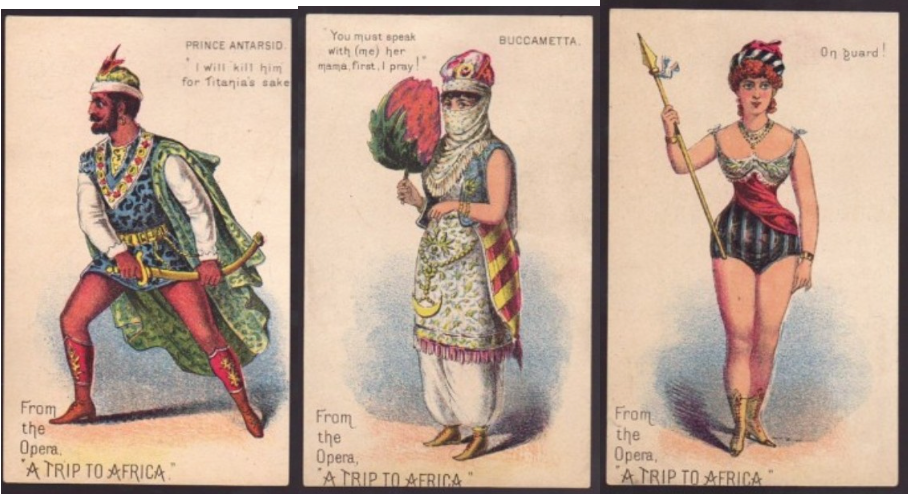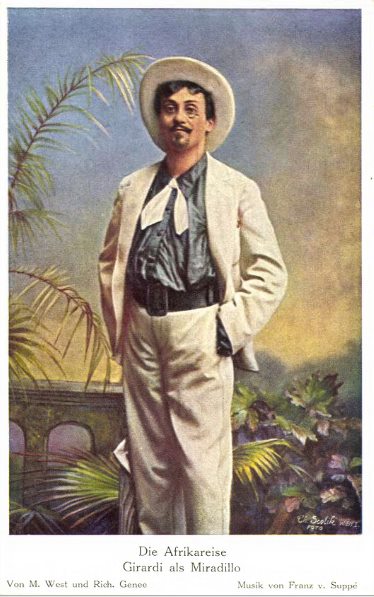Kevin Clarke
Operetta Research Center
7 August, 2016
The enthusiasm is impressive and a role model, no doubt: conductor Dario Salvi got so excited about Franz von Suppé’s 1883 revue operetta Afrikareise – set in Cairo and playing with all elements of 19th century orientalism – that he decided to investigate the performance material of this show, and issue a book that offers the original German textbook, the original 1884 English language Boston version, and a historic Italian version from the Lombardo Opera in Milan. The resulting 357 page book was published with Cambridge Scholars, which sounds impressive and highly academic. The hard-back edition with an English language foreword by Suppé’s biographer Hans-Dieter Roser, a preface by Dario Salvi, an introduction by Robert Ignatius Letellier, with synopsis and historical reviews, costume and set designs is now available as A Trip to Africa – at the steep price of £ 59.99, which converts to nearly 70 Euros. These are scholarly prices, indeed. Is the book worth the investment?

Cover for the book “A Trip to Africa.” (Cambridge Scholars)
This is a tricky question. Because obviously we here at the Operetta Research Center think it is fabulous to have a multi-lingual edition of a forgotten Viennese operetta. There are few such libretto editions available, and if they are around, they are usually German only. Which limits their impact on the Anglo-American world, limiting the international resonance.
If you expect to find a full text – songs, dialogue, stage directions – in this edition, you will be slightly disappointed. The German (original) version presented here only includes the lyrics, the complete dialogue is limited to the English and Italian versions. (What happened to the rest of the German script?)
It’s also never quite clear to the reader what is the original Boston libretto, and what are the new translations made by Dario Salvi and his wife Hannah Salvi. Salvi says “it is the original Boston libretto, but completed with all the missing parts that were left out.” It would have been helpful to mark these extras. Also, to clearly differentiate between different versions combined here in the English book.
In their introduction, the editors write “some derogatory references have been omitted so that the operetta may be performed publically, however some content may still be seen as offensive.” Considering that the Vienna magazine Lyra called the show only “quite decent” (but not entirely), I would have appreciated the full script with all “derogatory references.” It is up to future stage directors to decide whether they want to eliminate jokes with a racist ring to our post-colonial ears. But a critical edition of the text should present the material as fully as possible.

Costume designs for the original Boston production of Suppé’s “Afrikareise.” (Photo: Dario Salvi Archive)
Afrikareise is about the culture clash of Western visitors and Muslim natives from Egypt and Africa; as such it could not be more topical today. Moritz West and Richard Genée provided Suppé with an excellent book, playing with stereotypes in a typically mad-cap operetta way, for example when Fanfani sings: “Am Tsad! Am Tsad! / Da kriegt man schöne Frauen; / Sind delicat wie Chocolad’; / Bald hell, bald dunkelbraun!” Is that racist? (That depends on who delivers such lines, and how.) Reflecting on African culture in general and Islam in particular, you get lines in the second act finale such as “Unterdrückt moralisch, / Das ist kannibalisch! / Kannibalisch! Unmoralisch! / Recht infernalisch! / Fast schon vandalisch’! Manches ist gar Theatralisch. (Jedoch höchst int’ressant!)”
It would indeed be fascinating to interpret such lines for a modern audience and show how the dialogue with the Muslim world has changed, or maybe not changed, since 1883/84.

Historical sets for Franz von Suppé’s “Die Afrikareise.” (Photo: Dario Salvi Archive)
There will be a concert performance at the Maddermarket Theatre in Norwich on December 3, 2016, based on the newly reconstructed version, conducted by Dario Salvi with full orchestra and soloists. This performance will use the English text – partly Boston, part Salvi adaptation – and will be recorded.
Obviously, that’s a performance I look forward to greatly. If the music is anything as good as the lyrics, then this Trip to Africa should be great fun. Reading the non-pc text in the new Cambridge Scholars edition certainly was. The photos included of the original set designs from Boston give you a clear idea what this “piquant opera” (Chicagoer Arbeiter Zeitung) once looked like. Reviewers raved about the “gorgeous costumes” and “splendid scenic effects.”

Suppé’s “Afrikareise” as seen in Boston, USA. (Photo: Dario Salvi Archive)
As a first attempt this is a highly laudable enterprise, and a highly valuable one. Sometimes it’s difficult to get it all right in a first attempt. So, let’s hope that whoever follows the path of Dario and Hannah Salvi in the future will learn from their pioneering African enterprise and correct the minor quibbles. I am sure the concert performance will answer many questions that I have after reading the book. And, yes, I hope that Die Afrikareise will make its way to a stage in Germany and Austria, too. And to the US, where it was already a success back in the 1880s. The Ohio Light Opera would be a prime candidate for an American staging.

Star comedian Alexander Girardi in his “Afrikareise” costume.
The central comedy role of Miradillo (“the braggart, the swindler, / always dressed, always airy, / Oh his cheek’s extraordinary!”) is a part that’s begging for a modern interpretation by some assured comedian who can deliver lines like “In all lands I turn up frisky, where the trav’ling’s not too risky” or “E’en the elephants tremendous, / Love me with a love stupendous, / The Rhinoceroses lastly, / When they see me pleased are vastly.” You hear a strong echo of Strauss’ Zigeunerbaron here, with the entrance song of Sándor Barinkay.
Incidentally, the overture to Afrikareise which you find on YouTube among other places is not by Suppé, as it turns out, it was compiled by Paul Lincke. Which only proves how popular the show once was, even in Berlin. Otherwise, why bother making a potpourri overture?
All of that said: I am getting my Italian dictionary out now, so I can at least try to read the Italian libretto too, till I get the full thing in English at Norwich in December.
Till then, thank you Dario and Hannah Salvi for taking all this trouble to collect the masses of material and make them available to the general public. Academic libraries should surly have this book in their collections, as a rare example of a modern-day operetta publication in English. We here at the Research Center look forward to more such endeavors.
For more information on the concert performance with the Imperial Vienna Orchestra, click here. To order the book from Cambridge Scholars, click here.
